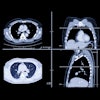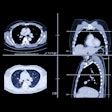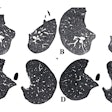
The U.S. Preventive Services Task Force (USPSTF) has concluded the preparation of its research plan for CT lung cancer screening.
First drafted earlier this year, the research plan details how the task force will review current research-based evidence in its evaluation of CT lung cancer screening. The task force has taken the public's comments into consideration and updated its latest plan with the following adjustments:
- Emphasizing that the screening test under consideration is low-dose CT, and not simply CT
- Revising several key questions of the systematic review to clarify topics such as stage shift, stereotactic body radiotherapy, and eligibility of International Early Lung Cancer Action Program (I-ELCAP) protocols
- Adding a contextual question related to the effectiveness of smoking cessation interventions for individuals undergoing screening
- Adding unnecessary treatment (e.g., surgical resection for a benign nodule), bronchopleural fistula, and respiratory failure to the list of potential harms of screening
The process is part of the USPSTF's routine review of lung cancer screening every five years. The next step for the USPSTF in the coming months will be to conduct its evidence review and draft a new recommendation statement.




















